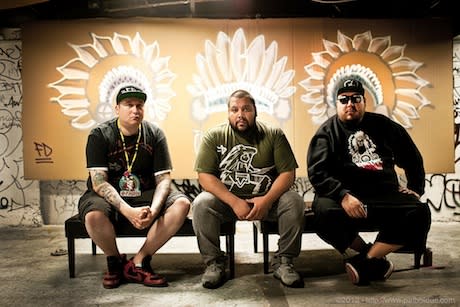People have been telling A Tribe Called Red's Deejay NDN that the group's powerful new record Nation II Nation sounds like a concept album. After a year of breaking through to undreamed of levels ― getting long-listed for the Polaris Music Prize for last year's self-titled debut, touring to bigger and bigger audiences, and being at the forefront of the Idle No More political movement ― NDN has struggled for months to come to terms with what exactly this new album represents.
"Now I see what the story is," he says. "It's just about this time we're living in now, living in Ottawa watching Idle No More start happening right outside our door. All of that influenced us on a surface level, but also in the way that we're creative. Seeing all those proud First Nations people stuffed into Ottawa, that gets you in the heart, in the stomach: that makes you feel stronger."
"Nation to nation" (note: present tense, it's still happening) is one of Idle No More's axioms; the definition of the rules of engagement required between aboriginal people and settlers. The concept resounds through the group's activities, says Bear Witness. "[It also refers to] the different nations in our group," says Bear. "As well, what we're seeing in bass music is we're getting all these aboriginal nations around the world having the same ideas at the same time, doing the same kind of work."
The concept extends to the relationship with their label, Tribal Spirit. Nation II Nation is constructed from samples of other artists on the label, which eliminates the need for costly, time-consuming sample clearance while shining a spotlight on the rest of Tribal Spirit's roster. "They opened up their catalog to us with the agreement that they would be able to use our remixes on albums [by] the drummers that we've sampled," explains NDN.
Building these tracks opened up new possibilities. "For the first time we got some a cappellas. A cappellas were a strange request. I think in most instances [pow wow recordings] are a single mic recording, like what you would see at a pow wow, with one mic in the middle of the drums. Tribal Spirit has been playing with multi-tracking and sent us just stems from female backup vocals, which you never hear. The men sing, the lead singer will sing a solo and people will sing on top of it but you never hear just a woman's voice. So on the track 'Sisters' we were able to take just that female backing vocal and chop it up into the track, which creates something that you definitely never heard before."
What started as a party night in Ottawa a few years ago has turned into a powerful bonding experience. "We've just become more comfortable working together," says NDN. "We all have such different backgrounds in music that before, it seemed like you could hear more of one or the other of us in a track. Now we're having a better time bringing those influences together."
"Now I see what the story is," he says. "It's just about this time we're living in now, living in Ottawa watching Idle No More start happening right outside our door. All of that influenced us on a surface level, but also in the way that we're creative. Seeing all those proud First Nations people stuffed into Ottawa, that gets you in the heart, in the stomach: that makes you feel stronger."
"Nation to nation" (note: present tense, it's still happening) is one of Idle No More's axioms; the definition of the rules of engagement required between aboriginal people and settlers. The concept resounds through the group's activities, says Bear Witness. "[It also refers to] the different nations in our group," says Bear. "As well, what we're seeing in bass music is we're getting all these aboriginal nations around the world having the same ideas at the same time, doing the same kind of work."
The concept extends to the relationship with their label, Tribal Spirit. Nation II Nation is constructed from samples of other artists on the label, which eliminates the need for costly, time-consuming sample clearance while shining a spotlight on the rest of Tribal Spirit's roster. "They opened up their catalog to us with the agreement that they would be able to use our remixes on albums [by] the drummers that we've sampled," explains NDN.
Building these tracks opened up new possibilities. "For the first time we got some a cappellas. A cappellas were a strange request. I think in most instances [pow wow recordings] are a single mic recording, like what you would see at a pow wow, with one mic in the middle of the drums. Tribal Spirit has been playing with multi-tracking and sent us just stems from female backup vocals, which you never hear. The men sing, the lead singer will sing a solo and people will sing on top of it but you never hear just a woman's voice. So on the track 'Sisters' we were able to take just that female backing vocal and chop it up into the track, which creates something that you definitely never heard before."
What started as a party night in Ottawa a few years ago has turned into a powerful bonding experience. "We've just become more comfortable working together," says NDN. "We all have such different backgrounds in music that before, it seemed like you could hear more of one or the other of us in a track. Now we're having a better time bringing those influences together."
